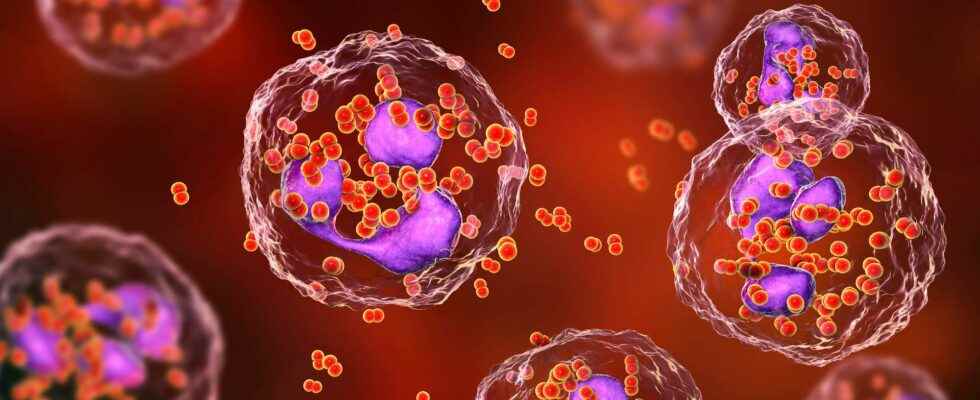You will also be interested
The meningococcal meningitis is an infection perceived as rare, yet in 2019 doctors recorded more than one case per day and more than one death per week on average in our country. Indeed, a study by Public Health France and the Institut Pasteur reports 459 cases diagnosed and 55 deaths during the year 2019 in metropolitan France and in the overseas territories.
Meningococcal meningitis is an infection caused by the bacterium Neisseria meningitidis, also called meningococcus. Grouped into 12 serogroups designated by letters, strains of serogroups A, B, C, W, and Y are responsible for 99% of diagnosed infections. In France, in 2019, more than one in two cases (53%) is caused by meningococcus B, but Public Health France noted that meningococcus W became more frequent between 2018 and 2019, increasing from 14% to 21% cases. A worrying trend since this hypervirulent serogroup has the highest case fatality rate and accounted for 45% of deaths in 2019.
Invasive meningococcal disease, an unpredictable and severe disease
The infection is unpredictable. The contamination is done via prolonged contact with infectious respiratory secretions. Neisseria meningitidis can be found in the microbial flora of the throat, without the person developing symptoms. Nearly 30% of 15-25 year olds are healthy carriers. The passage of the bacteria through the mucosa breathing allows it to join the blood and reach the meninges. This spread of the bacteria will trigger different symptoms.
Difficult to diagnose, a meningococcal infection initially causes non-specific symptoms that do not allow it to be distinguished from other illnesses: flu-like illness, fatigue, aches, etc. When the symptoms become clearer, the infection is already installed. In adults, this infection results in photophobia, irritability, headaches and vomiting; and in children, behavioral disturbances and fever.
The acute phase evolves quickly, the condition of patients can deteriorate in a few hours if nothing is done. All serogroups combined, invasive meningococcal disease is fatal in approximately 10% of cases. Up to 20% of survivors may suffer from sequels serious and disabling. Hearing Loss, amputationlearning disabilities are examples of sequelae related to the initial infection.
Meningococcus and after? Flavio’s story
Flavio has been living with the consequences of his invasive meningococcal infection since 2019. At 17, he fell ill while studying in Clermont-Ferrand to become a professional footballer. Its first symptoms are classic: fever, fatigue, body aches, feeling hot and cold. A first medical appointment does not diagnose the infection. The young man does not think of talking to the doctor about his pain to the right leg which he attributes to his practice of sport. Barely a few days after the first symptoms, his condition deteriorated sharply. He can no longer put his leg on the ground, hardly sleeps or eats, he is dazzled by the lights strong and then, the blackout “, he says.
He spends three days in the coma. When he wakes up, he has lost twenty kilos and can no longer get up. Doctors tell him that he has contracted meningococcal septicemia. While meningitis is the most common form of infection Neisseria meningitidisthe bacteria can also contaminate the blood – sepsis – and other organs.
If his condition stabilizes, Flavio is not out of the woods. Indeed, his right leg must be amputated to completely eradicate the infection. The young man abandons his dream of becoming a professional footballer. In 2021, he had to undergo more than ten surgeries as a result of his infection. Nevertheless, his prosthesis did not slow down his desire to evolve in the world of sport and football. His story is to be heard in full and all those of survivors or carers who have had to face meningitis in the series of podcasts ” Unpredictable from Sanofi France.
Article produced in partnership with Sanofi
Sources:
Public Health France and Institut Pasteur: “ Invasive meningococcal infections in 2019 “.
Krone M et al. Increase of invasive meningococcal serotype W disease in Europe, 2013 to 2017. Euro Surveill. 2019; 24(14):1-9.
https://www.bjanaesthesia.org/article/S0007-0912(17)36961-1/fulltext
https://www.ncbi.nlm.nih.gov/pmc/articles/PMC8565481/pdf/main.pdf
Sanofi Pasteur Europe SAS with capital of €58,200,000 – RCS Lyon B 821 177 425
FRAN000004272 MAT-FR-2202268 June 2022
Interested in what you just read?
